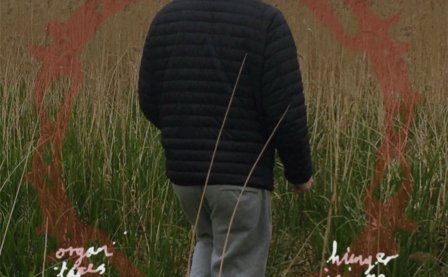“Polyphony is music in which autonomous melodies intertwine. In Western music, the madrigal and the fugue are examples of polyphony. These forms seem archaic and strange to many modern listeners because they were superseded by music in which a unified rhythm and melody holds the composition together.”
Organ Tapes communicates with the listener obliquely. His music is painterly, operating through gesture and refraction. His vocals are slurred and auto-tuned, his beats amorphous and textured. On Words Fall To Ground, his second collection of original material, his sound continues to expand and accrete, filling up space gaseously, pregnant with affect, linear propulsion subsumed by drift and swell.
“In the classical music that displaced baroque, unity was the goal; this was ‘progress’ in just the meaning I have been discussing: a unified coordination of time. In twentieth-century rock-and-roll, this unity takes the form of a strong beat, suggestive of the listener’s heart; we are used to hearing music with a single perspective.”
The EP begins on “Guess Riddim’s” turbulent seas. Elastic beats and spacious bass churn underneath Organ Tapes’s and Malibu’s vocals, woven together like wisps of smoke. The track follows the curl of their voices, swaying between percussive structures, tight syncopations giving way to a skittering dembow sway. Melancholia and resignation predominate, hazy sighs forming precarious shapes. “Guess I need you like that/ Guess I’m impatient”; “Say I’m on the right track/ Don’t leave me waiting.”
“Painless” moves underground, its beats falling in great sheets of concrete and steel, pushing the vocals into a dense blackness, where all is rushing, burrowing, and breaching. There’s an emptiness here, a sense of encroaching dark in the vocals, in the stammer of the beats. “The silence of your scream.” Grasping for dawn. Ballads for dark nights of the soul.
“When I first learned polyphony, it was a revelation in listening; I was forced to pick out separate, simultaneous melodies and to listen for the moments of harmony and dissonance they created together.”
“Turned” turns my attention upwards; its sounds scratch at my eardrums. I notice the shivering beats, the frenetic keys, the way the track recoils from view, its eyes darting nervously — wary, hurt. I feel how it moves, shifting its weight, reaching outward, “You give me something I believe in,” its vocal melodies poised, charged; sadness and beauty indivisible. Loaded with import, with drama, the track spins slowly, wrapped in gauze, assembling itself, finding a moment of weightless serenity in its chorus, returning.
“Believer” is quiet, ornate. Carbonated synths. Thump. Piano. Strange melodies at odd angles. Braided voices, their edges spectral, marked with absent presence. “I don’t want to feel like that/ I don’t want to feel like that,” “Every time I wake up/ In my empty room.” It subsides quietly. Oblique club tracks limned by heart-on-sleeve vocals.
“This kind of noticing is just what is needed to appreciate the multiple temporal rhythms and trajectories of the assemblage.”
– Anna Tsing, The Mushroom at the End of the World: On the Possibility of Life in Capitalist Ruins, pp. 23-4.
Words Fall To Ground is an accumulation of carefully sculpted sound, a dense collage, thrumming with feeling. Like recent work by Elysia Crampton and Chino Amobi, this music elides those forms of listening that focus on linear development — the individual sonic thread, the smooth transition. Rather, Words Fall To Ground opens itself to dissonance and confusion, encouraging an attentiveness to the non-congealing of sound. Like Anna Tsing’s matsutake mushrooms, which arise in the ruins of human inhabitation and capitalist production, this music is disinterested in ends, in progress. It circles, drifts, and swells, looking differently, feeling differently.
More about: Organ Tapes




